I have a friend who casts a fly for neither distance nor accuracy nor stealth. Aside from those limitations, he’s a splendid fisherman. It’s not for lack of strength or dexterity or intellect that he casts with less than average skill. Warren is a farm boy from Catawba, Wisconsin, and he has the farm-boy frame you’d expect: bone, muscle and gristle. He learned to play ice hockey and fly airplanes in his forties. He has a PhD in physics, teaches at Michigan Tech, and travels the world lecturing about a subject he calls “energetic materials”—something you or I would call “explosives” or “bombs.” Warren shouldn’t be such a crappy fisherman. He just doesn’t fish enough.
When he’s not in Pullman or Boston or Basel or Turino, Warren usually joins me in early summer for a camping trip on the Escanaba River. We fish, drink scotch, tell stories, play cribbage, and sleep, usually, but not always, in that order. One morning during a recent trip—before we started fishing or drinking or telling or playing—Warren learned a tree had fallen on a friend’s shed. Warren generally jumps at the chance to help a friend in need; he hops and skips when he gets to use his tractor.
“I need to run into town for a few hours. I should be back in time for the evening hatch. Don’t wait for me if I’m late. I’ll catch up with you on the river.”
“Do you have enough flies?” I asked.
“Sure.”
More Like This
He proudly flashed a small plastic box that held one black Woolly Bugger, two Zug Bugs, two Prince nymphs, a worn-out Muddler Minnow, and three large Royal Wulffs. “If those don’t work, I have plenty of Scotch.” He patted my back, winked, and leapt into his car. A toxic cloud of cigar smoke billowed through the window of the battered old Omni, and then he was gone.
By the time Warren returned from his trip to town, I was waist-deep in the Escanaba River, straining to solve a demoralizing hatch. Steady winds and intermittent rains kept all but the tiniest bugs off the water—only teeny flies, wispy tippets, and perfect drifts could catch a fish on this un-enchanted evening. The fishing was tough and technical, and I worked hard to hook a small fish every half hour or so. What the heck would Warren do? The smallest fly in his box was a size 14 Royal Wulff, and his tippet diameter was determined by the number of times he cut off and retied a fly to his lone tapered leader. He was screwed.
Not that a better fly inventory would matter. Warren loves the Royal Wulff. He loves to fish it in all the wrong ways, in all the wrong places, at all the wrong times. If another aviating angler hadn’t invented that fly, Warren would probably fish with spinners or spoons or pork chops.
Like Warren, Lee Wulff was an avid and accomplished pilot. Unlike Warren, Lee Wulff was a fly-fishing innovator. He conceived the fishing vest, popularized left-handed reels, persuaded fishermen that “game fish are too valuable to be caught only once,” and developed a prominent style of fly that inherited his name. His most famous pattern—the Royal Wulff—is a colorful and bushy fly that Lee himself described as strawberry shortcake for trout. This is Warren’s favorite fly.
Lee’s talents and skills—like Warren’s—extended far beyond fly fishing. His restless pursuit of education introduced him to engineering at Stanford and art in Paris. He began his career with a New York City advertising agency, but ultimately found fame as an artist and fly-fishing icon.
The fly-fishing community was shocked in 1991 when Lee’s single-engine Piper Cub crashed near Hancock, New York. His copilot survived the accident and insisted that the crash had not caused Lee’s death; instead, it was Lee’s untimely death from a heart attack that had caused the crash.
Thinking about Lee’s unfortunate crash reminded me of the time when Warren—who lives near Hancock, Michigan—nearly died while flying a Piper Arrow somewhere between Spokane and Pullman. He was perfecting the maneuvers he’d need to demonstrate during an upcoming commercial license exam, and his main aim was to polish a procedure for recovering from a stall.
Cruising at about four thousand feet above the Palouse prairie, Warren deliberately pulled the Piper’s nose upward until the wings stopped carrying the plane. The plane stalled, and, because the clockwise rotation of the engine’s propeller pushed more wind under the right wing than the left, the right rose and the left dipped. As the plane began its predictable leftward cant, Warren did precisely what he had been taught to do, and exactly what he had done dozens of times before. But something was wrong. The left wing continued to fall until the aircraft entered a life-threatening spin.
Although recovering from a spin is too dangerous to practice, Warren had read enough to know what to do. He pushed the buttons and switches he needed to push. He pulled the levers and knobs he needed to pull. He did everything he had read about that would stop the spin, and his calm and resourceful actions caused the plane to cease spinning and resume flying. Unfortunately, however, the Piper was on a vertical flight path and pointed straight for the prairie floor. Without panic, Warren forcefully raised the plane’s nose, and the aircraft leveled with fifteen hundred feet to spare. The entire ordeal lasted less than fifteen seconds.
My remembrance of Warren’s heroics reminded me he was a brave and capable pilot. But it also reminded me that—despite his mastery of aviation, tractors, and energetic materials—he was not a proficient piscator. He and his nine flies would be no match for this hatch, so I succumbed to the shame, reeled in, and set out to find my friend. The rain had stopped, but the wind was still strong and the skies were darkening. If I was going to help him catch a fish, I’d have to find him soon. I roamed the river until it was too dark to see, and then reluctantly returned to camp to find Warren relaxing beside a roaring campfire with a cribbage board stationed on a small table between his chair and mine. I was gut-punched by guilt. At least he had some Scotch.
“Hi, Warren. Did you get back in time to do some fishing?”
“Sure.” he said.
“How’d you do?” I asked, and readied myself for remorse.
“Great. I caught one fish that was over eighteen inches, one that was about seventeen inches, and several that ranged from twelve to sixteen.”
“Really?” I expect a little embellishment in fish camp, but this was ridiculous. I inspected the Scotch bottle. It was nearly full.
“Take a look. I have some photos on my computer.”
Warren went on to explain that I was busy landing a small trout when he arrived at the river. Not wanting to bother me, he hiked upstream and began fishing above an old log that was a fixture in the river. The wind was gusting in the downstream direction, so Warren attached a big bushy Royal Wulff to his stumpy tippet and let the gale do most of the work. He flipped the colorful fly off to the side and let it skate into the slack water just above the log. Nothing happened until it began to rain. But the moment raindrop dimples covered the water’s surface, hefty trout emerged from the deep water beside the log and assaulted the Royal Wulff on every cast. Warren had returned to camp when he was down to his last Wulff and it looked like the rain had stopped for the night.
“How the heck did you figure that out?” I asked.
“Well, it’s sorta like the time I got in trouble while flying out in Washington. I had never actually done it before, but I remembered reading about it somewhere. So I tied on a Royal Wulff and gave it a try. Holy man, did it work. I’ll tell you what, Tim, if someone watched me recover from that spin in Spokane or catch those trout tonight, they’d have to say it looked like I knew what I was doing.”
I sat dumbfounded while Warren stashed his computer in the Omni.
“How’d you do?” he asked. “I bet you cleaned up, too.”
“Pass the scotch, friend. Low card deals.”

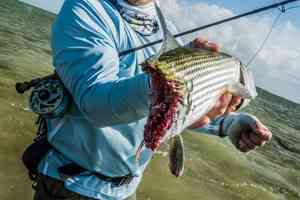
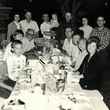

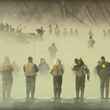
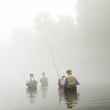
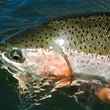
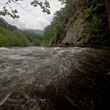



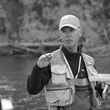

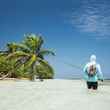


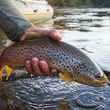








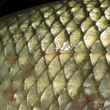
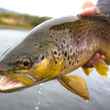
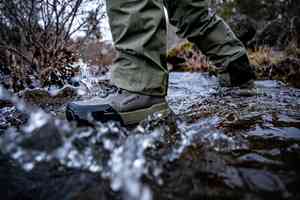



Comments
Gene Larson replied on Permalink
Great story. I have a friend I could describe almost in exactly the same terms. I always am humbled when I fish with him, except for steelhead. That is one category I know I'm ahead on.
Pages